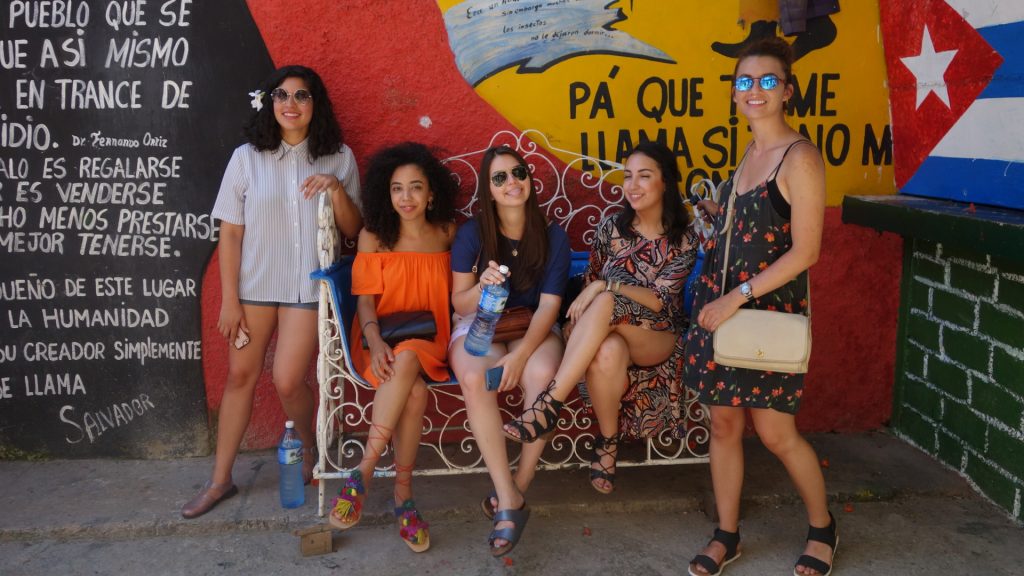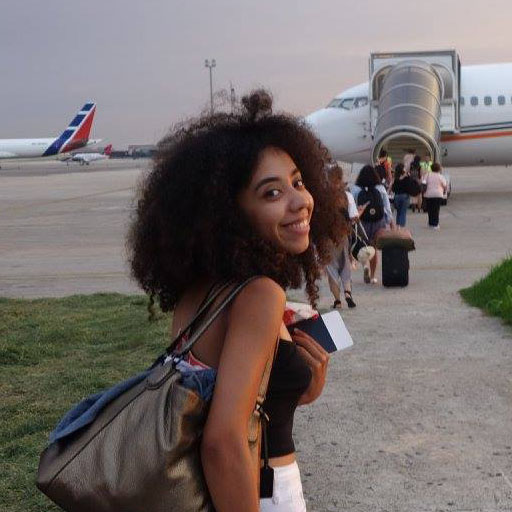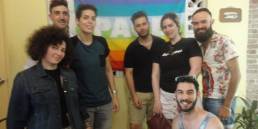As US and Cuba relations continue to thaw, younger generations of Cuban Americans are getting curious about the island that houses their heritage.
While not everyone within the household of a Cuban family may always agree about the embargo (or the impending end thereof), there’s no denying that Cuba is currently the subject of quite a lot of chatter. In the midst of all the interest sprung the CubaOne Foundation. Inspired by the concept put into action by Birthright Israel, CubaOne started their Tu Cuba trips – free to select Cuban American applicants ages 22-35! In their own words, CubaOne promises that “You’ll stay in Cuban homes (casas particulares) and we work hard to create authentic experiences for our participants by facilitating connections with ordinary Cubans from all walks of life who will speak candidly with you about life on the island. Our program includes time for you to explore and get to know Cuban peers.”
After getting in touch with one of the fellows from the very first Tu Cuba trip, we were able to ask her some questions about her experience visiting the homeland for the first time. Michelle Alfonso shares her thoughts about her adventures in Cuba.

Victoria Freyre: Let’s start with the basics: What is your name and what part of Cuba is your family from?
Michelle Alfonso: My name is Michelle Alfonso and I’m from New York. My grandmother was born in Ranchuelo (Santa Clara).
VF: Let’s talk myth v. reality: What expectations did you have before you headed to Cuba for the first time?
MA: I didn’t know what to expect. I grew up hearing small snippets of what Cuba is like from my grandmother. She left in ‘62 and never returned. She adapted to American culture and left behind a lot of Cuban influence. I didn’t grow up in a traditional Cuban household at all, so I went in with a blank slate. I knew I was going into a country with not many resources and I was expecting to be uncomfortable.
VF: What was something that pleasantly surprised you about the island, it’s people, etc.? Something that completely defied your expectations.
MA: Something that completely surprised me was how up to date the Cuban people are. They watch the same TV shows and movies and know about current politics and what’s going on in the world. They are not in the dark at all. I was also pleasantly surprised at how social and outgoing everyone is. The personalities are out of this world.
They make you feel so comfortable, like you’re family.
VF: What realities about the island struck you?
MA: Whatever the Cubans lack, they find a way to be resilient. Simple pleasures aren’t as accessible in Cuba, like wifi and internet, but they find a way around it. The strength of the community really struck me as well. Everyone looks out for each other. It’s a very homogenous feeling.
VF: The question on every Cuban child’s mind: what did your parents and/or grandparents have to say when you told them about your trip with CubaOne? What were their reactions?
MA: My mom was ecstatic. She immediately screamed out “CHANGO!”. My grandmother was excited and started calling everyone she knew on the island to brag and let them know I was coming. My situation is a little different than most. I didn’t realize that families were broken apart and have mixed feelings about going. When my grandmother left Cuba, she was not leaving much behind. She was not very wealthy in Cuba and didn’t care for the politics as much as other Cubans.

VF: What advice would you give to Cubans (First Generation, Second Generation, or Exiles themselves) planning to head to the island for the first time?
MA: I’ll give the same advice my grandmother gave me when I left: “cojelo suave” (take it slowly).
Go in with an open mind and take in as much as you can. Don’t rush or jump to any conclusions. Take it slow and enjoy it while it lasts. Talk and make connections with as many people as you can.
VF: If you could go back in time and give yourself one piece of advice before your trip to Cuba, what would it be?
MA: I would tell myself to not be self conscious about the language barrier and push to communicate with as many people as possible. Cubans are very forgiving and patient with language. They are willing to understand what you’re trying to say regardless of how you say it.

VF: Tell us about the funniest moment you experienced on your trip.
MA: There were so many funny moments because Cubans have an amazing sense of humor. One that sticks out in my mind is a moment I had with one of the workers at a casa particular in Havana. My Spanish is not so great so we ended up communicating by using a lot of hand gestures. One day I wanted to iron a dress I was going to wear. The worker said he really didn’t know how to iron, but set everything up for me and stayed by my side to make sure I did it right. I don’t know how to iron either. When he saw me ironing he grabbed it from me and said even he could do a better job. We joked the whole time that we were going to burn the house down. He told me if his wife ever saw him ironing that she would never let him hear the end of it. It was a really small moment but funny because we were bonding over how bad we iron. Some things are easy to translate.
VF: Tell us about the saddest moment you experienced on your trip.
MA: Leaving. I had just experienced the most amazing and life changing moments of my life and it was all ending. I thought of my grandma and how she must’ve felt leaving her country for the last time and never returning. At the same time it was a happy moment because I had gained so much wisdom. I cried tears of sadness and joy during lift off.

VF: What was the most memorable part of your trip?
MA: CubaOne set up a beautiful horseback ride through the Viñales countryside lead by real caballeros. I had never ridden on a horse before. We went early in the morning when there was fresh dew on everything. The soil in Viñales is bright red. It was absolutely breathtaking to see the earth like that, watch the natural wildlife roam, and hear about the caballeros’ life and how they live. I’ll never forget it.
VF: How did your view change (if at all) when you got back to the states?
MA: I realized that Cuba is an extremely significant country especially in this moment. I never felt more proud to be connected to Cuba. I learned that family and community are important. I also learned to appreciate the simpler things in life.
VF: Finally, do you think it’s important for children of Cuban descent to visit Cuba in person? Why or why not?
MA: Absolutely. You can listen to all the stories and see all the pictures but nothing will come close to experiencing Cuba for yourself. I believe that it’s absolutely necessary for your well being to know where you came from. For someone like me, who was not very connected to their culture, who grew up confused about their cultural identity, visiting Cuba made me feel whole.

This post previously appeared on the Everyday Ambassador blog.
Victoria Freyre
Victoria is a Cuban American writer and Communications Director at Everyday Ambassador. Born and raised in the humid suburbs of Miami, Victoria currently resides in the delicious city of Chicago with her husband and her slightly maladjusted pup.

